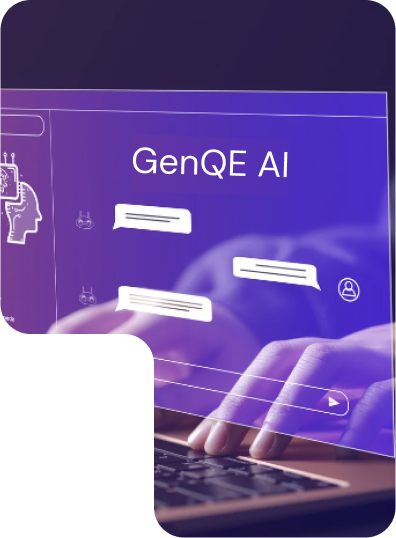
Kimmi
December 26, 2024 | AI in Software Testing
In the dynamic realm of software development, ensuring comprehensive and efficient testing is crucial for delivering high-quality products. Traditional manual test case generation can be time-consuming and prone to human error, often leading to incomplete coverage and delayed releases. GenQE addresses these challenges by leveraging artificial intelligence to automate and enhance the test case generation process.
Understanding GenQE's AI-Powered Test Case Generation
GenQE employs advanced AI algorithms to analyze various requirement documents, including Word, Excel, PDFs, and even videos. By processing these diverse inputs, GenQE identifies application flows, extracts test data variables, and generates both functional and non-functional test cases. This comprehensive approach ensures thorough testing coverage and reduces the reliance on manual efforts.

Benefits of AI-Driven Test Case Generation
Faster Launch GenQE rapidly generates test cases, significantly reducing the time required compared to manual methods. This acceleration enables quicker iterations and faster time-to-market.
Wider Coverage By exploring a wide array of scenarios, including edge cases, GenQE ensures more thorough test coverage, leading to higher software quality.
Less Manual Work Automating test case creation minimizes manual effort, allowing testers to focus on complex and exploratory testing activities.
Higher Accuracy AI-powered test generation reduces human errors, ensuring consistency and reliability in test execution.
Resource Optimization Automating test case generation allows human testers to focus on high-value testing activities, optimizing resource allocation.
Implementing GenQE in Your Testing Workflow
To integrate GenQE into your testing process, follow these steps:
Onboarding: Utilize GenQE's seamless self-user onboarding or Single Sign-On (SSO) login to set up your account.
Model Training: Train the AI model using your requirement documents or by recording existing applications. GenQE supports various formats and integrates with tools like Jira and GitLab for comprehensive data ingestion.
Test Case Generation: Allow GenQE to automatically generate functional and non-functional test cases based on the analyzed data. The platform also captures test evidence during execution and creates defects if tests fail, predicting root causes and avoiding duplicates.
Review and Execution: Review the generated test cases and execute them within your testing environment. GenQE reporting and analytics, providing real-time insights into your testing process.
By incorporating GenQE into your software development lifecycle, you can achieve a more streamlined, efficient, and thorough testing process, ultimately leading to higher-quality software products and faster time-to-market.
Challenges and Considerations
While AI-powered test case generation offers numerous advantages, it's essential to be mindful of potential challenges:
Data Quality: The effectiveness of AI models depends on the quality and comprehensiveness of the data they are trained on. Incomplete or biased data can lead to suboptimal test cases.
Complex Scenarios: AI may struggle with highly complex or nuanced scenarios that require deep domain expertise or contextual understanding.
Ethical Considerations: Ensuring that AI models do not introduce biases into testing results is crucial. Ethical issues such as algorithmic bias and privacy must be closely scrutinized.


